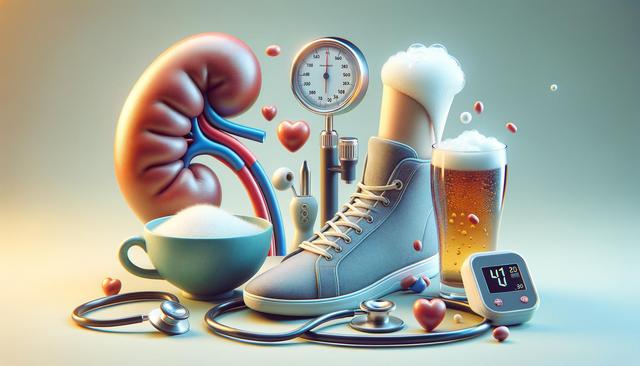Recognizing the Early Symptoms of Kidney Disease
Kidney disease often develops silently, with few noticeable symptoms in the early stages. However, early detection is crucial, especially before reaching stage 4 chronic kidney disease, where the risk of kidney failure becomes more imminent. Recognizing warning signs can help patients take proactive steps to protect kidney function and explore alternatives to dialysis. Some of the earliest symptoms include:
- Persistent fatigue and weakness
- Swelling in the ankles, feet, or hands (edema)
- Changes in urination patterns, such as more frequent or less frequent urination
- Foamy or bubbly urine indicating protein presence
- High blood pressure that is difficult to control
These symptoms may be subtle but should not be ignored, especially in individuals with diabetes or hypertension. A timely visit to a healthcare provider can lead to early diagnosis and better management plans.
Understanding the Link Between Kidney Disease and Other Chronic Conditions
Kidney disease is often interconnected with other chronic illnesses such as diabetes and high blood pressure. These conditions can accelerate damage to the kidneys and make symptoms more complex. For individuals managing multiple health conditions, it’s essential to adopt a lifestyle that supports overall well-being. Following a Diet for Diabetes High Blood Pressure and Kidney Disease can significantly reduce the progression of kidney damage and improve quality of life.
Typical dietary recommendations for such individuals include:
- Limiting sodium intake to help control blood pressure
- Reducing protein consumption to lessen kidney workload
- Monitoring potassium and phosphorus levels
- Managing blood sugar through balanced carbohydrate intake
Working closely with a dietitian can help tailor a meal plan that supports all three conditions while maintaining nutritional balance.
What to Drink to Keep Kidneys Healthy
Staying hydrated is vital for maintaining kidney health, especially in the earlier stages of kidney disease. However, not all beverages are equally beneficial. Choosing What to Drink to Keep Kidneys Healthy can make a significant difference in slowing disease progression and supporting overall kidney function.
Some kidney-friendly drink options include:
- Water – the most recommended drink for flushing toxins
- Herbal teas – certain blends can support kidney health without caffeine or sugar
- Low-potassium fruit juices – such as apple or cranberry juice, in moderation
- Infused water – adding slices of cucumber or lemon can encourage fluid intake without added sugar
Avoiding sugary beverages, excessive caffeine, and alcohol is equally important. These substances can strain the kidneys and contribute to dehydration, further challenging already weakened kidney function.
What is the Best Thing to Drink for Your Kidneys
Determining What is the Best Thing to Drink for Your Kidneys depends on an individual’s overall health and the stage of kidney disease. While water is universally beneficial, those with advanced kidney disease, such as stage 4 CKD, may need to monitor fluid intake more carefully to avoid complications like fluid retention and high blood pressure.
For many patients, especially those with limited kidney function, it may be advisable to:
- Follow prescribed fluid limits from a healthcare provider
- Choose drinks with low sodium and phosphorus levels
- Stay away from dark sodas and sports drinks that contain additives harmful to the kidneys
In cases where fluid intake must be restricted, patients can compensate by controlling the amount of salt in their food, which helps prevent excessive thirst and fluid buildup.
Exploring Alternatives to Dialysis in Stage 4 CKD
Stage 4 chronic kidney disease often leads patients to consider treatment options like dialysis. However, there are also non-dialysis alternatives that may help manage symptoms and preserve kidney function for as long as possible. These approaches focus on slowing disease progression, improving quality of life, and preparing for long-term care decisions.
Alternatives to dialysis may include:
- Comprehensive lifestyle changes, including diet and exercise
- Strict management of blood pressure and blood sugar
- Use of medications that protect kidney function and reduce protein in the urine
- Monitoring and treating anemia and bone health issues associated with CKD
In some cases, patients may also explore conservative management, which involves symptom control without dialysis. This approach is especially relevant for those who may not benefit significantly from the procedure due to age or other health conditions. It’s important to have open conversations with a nephrologist to understand the full range of options available.
Conclusion: Taking Charge of Kidney Health Early
Early detection and proactive management of kidney disease can make a significant difference in slowing its progression and improving quality of life. By recognizing the early warning signs and understanding how other chronic conditions like diabetes and high blood pressure impact kidney health, individuals can take steps to protect their kidneys long before reaching stage 4 CKD. Thoughtful choices regarding diet and hydration—such as knowing What to Drink to Keep Kidneys Healthy and following a Diet for Diabetes High Blood Pressure and Kidney Disease—can support kidney function and overall wellness. For those already facing stage 4 CKD, understanding alternatives to dialysis can empower patients to make informed decisions that align with their health goals and personal preferences.




Leave a Reply